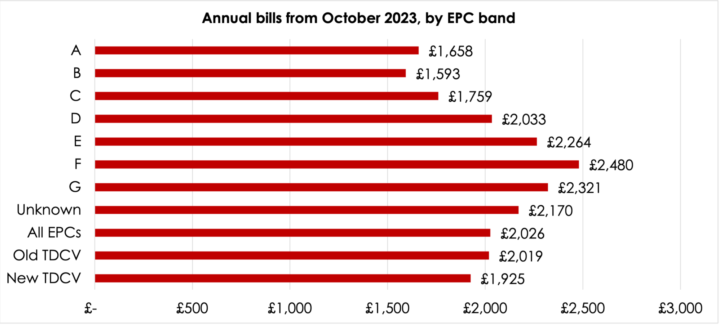New price cap: inefficient homes to pay around £720 more on bills as gas prices stay high
Homes rated Energy Performance Certificate band F are set to have bills £720 higher than a home rated EPC band C, the Government’s target for 2035.

By George Smeeton
info@eciu.netShare
Last updated:
With the dual fuel price cap forecast to reach £1,923 per year for the average home from October 2023 [1], new analysis by the Energy and Climate Intelligence Unit (ECIU) has found homes rated Energy Performance Certificate, a measure of the home’s efficiency, band F are set to have bills £721 higher than a home rated EPC band C, the Government’s target for 2035.
The average home in the UK is rated band D and these homes will pay £275 more for their gas and electricity this winter, compared to an EPC band C home.
Wholesale gas costs are set to remain two to three times higher than pre-crisis levels for the foreseeable future, meaning gas bills are expected to stay high. This has a knock-on impact on the costs of electricity, as around 40% of the UK’s electricity is generated by gas, and it usually sets the price for all generation. As more cheaper renewables are built, such as offshore wind farms, the price of electricity is expected to fall.

EPC band | Gas bill | Electricity bill | Total bill | Total difference to EPC band C |
A | £765 | £894 | £1,658 | - £101 |
B | £700 | £894 | £1,593 | - £166 |
C | £808 | £951 | £1,759 | N/A |
D | £996 | £1,037 | £2,033 | £274 |
E | £1,141 | £1,124 | £2,264 | £505 |
F | £1,213 | £1,267 | £2,480 | £721 |
G | £1,025 | £1,296 | £2,321 | £526 |
Unknown | £1,076 | £1,095 | £2,170 | £411 |
Old TDCV | £982 | £1,037 | £2,019 | £260 |
New TDCV | £945 | £980 | £1,925 | £166 |
Table 1. Annual gas, electricity and total energy bills by EPC band. EPC band G homes have lower energy bills than EPC band F because of the way in which the EPC is calculated, and that EPC band G homes often use other secondary sources of heat such as biomass.
Jess Ralston, Energy Analyst at ECIU said: “Unfortunately we're not out of the woods yet as gas prices are expected to stay at least 2x higher than pre-crisis levels in the longer term, and while lots of Europe has moved away from gas altogether we're still reliant on it. Last year the IMF said that this reliance is why we were hit harder than other countries.
“Those in the most inefficient homes could pay around £720 more on bills over the next year than those in energy efficient ones. We could have spent the last year insulating houses to shield them from future gas price spikes, and building more British renewables so we need to buy less expensive gas on the open market. Instead there seems to have been a focus on the North Sea, which won’t bring down bills.
“The Government’s flagship insulation scheme has flatlined this year, so getting it back up and running could help people in time for this winter and fulfilling pledges to tighten energy efficiency regulations for private renters and lifting the ban on onshore wind could help in time for next winter. Using less gas is the key to lower bills and energy security.”
Previous ECIU analysis has shown that deploying heat pumps and insulation is the fastest and most effective way to permanently reduce gas demand, gas imports and heating bills – as opposed to drilling for more UK gas which would not cut demand or the price. [2]
ECIU analysis has also found that energy efficiency schemes such as ECO have contributed to savings of £1.2bn per year under current prices, which will rise further under higher winter prices. [3]
Note to editors:
- ECIU analysis of Ofgem's Price Cap for October 2023: https://www.ofgem.gov.uk/publications/energy-prices-fall-again-winter
- How to cut the UK’s dependency on Russian gas… permanently (ECIU, March 2022): https://eciu.net/analysis/briefings/how-to-cut-the-uks-dependency-on-russian-gas-permanently
- Insulation installed over last decade saving Brits £1.2bn a year https://eciu.net/media/press-releases/2022/insulation-installed-over-last-decade-saving-brits-1-2bn-a-year
For more information and media bookings:
George Smeeton, Head of Communications, ECIU, Tel: 07894 571 153, Email: george.smeeton@eciu.net